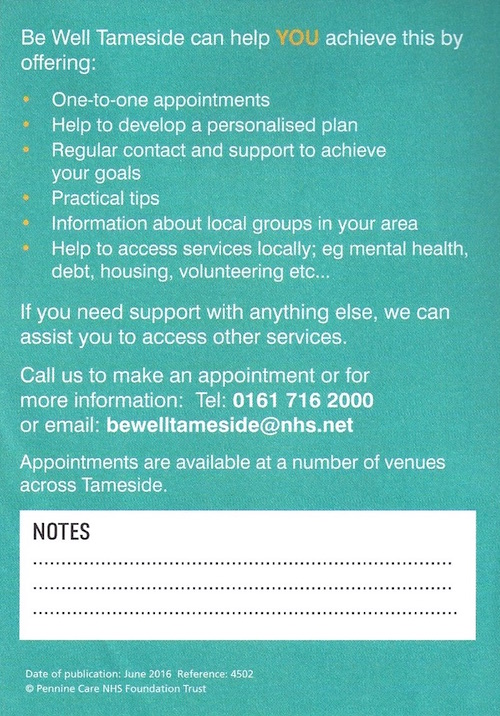There are lots and lots of theories on how to lose weight and claims on the best way to do this. Here we try to provide advice on what is available locally to help you and what you can do for yourself too!
How obese you are is currently determined by your Body Mass Index. You may find this in your medical record or you can calculate it based on your height and weight. Adults with a BMI of 25-29.9 are classed as overweight. BMI over 30 are obese. BMI over 35 are very obese and BMI over 40 are morbidly obese.
Here are some useful links for further information on obesity and what can be done about it
NHS Choices: Obesity
Patient.co.uk (Obesity and overweight in adults)
Patient.co.uk (Obesity and overweight in children)
See Be Well Tameside and get 1:1 support to help motivate you to lose weight
Article in the Washington Post – Take off that FitBit. Exercise alone won’t make you lose weight by Dr Aseem Malhotra.


Your doctor or nurse can help you to devise a personalised plan that can help you
You can get 1:1 training and support to lose weight via Be Well Tameside. This is how you can also access further care potentially leading to weight losing surgery as well.
Personal Trainer from Active Tameside
Ask questions from other people via HealthUnlocked Blog
Many patients do not realise they are overweight or obese because so many people suffer with it without realising it. You need to know your Body Mass Index and Waist Circumference. Often obesity can be associated with other complications including diabetes, cardiovascular disease, osteoarthritis, depression, stroke, abnormal liver tests, gall bladder disease, sleep apnoea, certain certain cancers and hypertension. Many of these things can be reversed or their impact reduced by reducing your weight. Assuming there is no specific underlying medical cause, your weight is ultimately dependent on the types and quantity of food you eat and the amount of exercise you do.
It is important to monitor your weight. Agree goals with your doctor or nurse which have SMART objectives (Specifiic, Measurable, Achievable, Realistic and Timely). That way you can see how well your strategies are working and whether they need to be reviewed or not. If you are over 40 then you should have an NHS Health Check done every 5 years. That will give you a baseline to start from. Then see if you can make small changes in your lifestyle that you are able to adopt. Your doctor or nurse will be able to inform you about what else you need to do over the coming year if you have other related conditions that also need to be managed.

Make a plan to help lose weight
- Agree a care plan with your doctor or nurse which includes regular monitoring of your weight
- Agree small changes in your weight that you hope to achieve over the next few weeks and how you hope to achieve them.
- Agree changes in your diet and exercise that you hope to achieve. Making small changes rather than wholesale change is more likely to succeed in the long run.
- Make a note of your weight so that you can see what is happening over time.
- Make notes on what is helping you and also what is hindering you. These are personal to you but which will provide insights now and in the future on how to make the necessary changes for you to succeed.
- Do not be disappointed if you do not get the expected reduction in weight as you hoped for,
- See if you can get your family and friends to join you. They will help to motivate you too and we all need a little help (even if you are the one motivating them too!)
- Have a lot of fun and be happy. Imagine how much your weight would be if you did not do what you are doing now!
